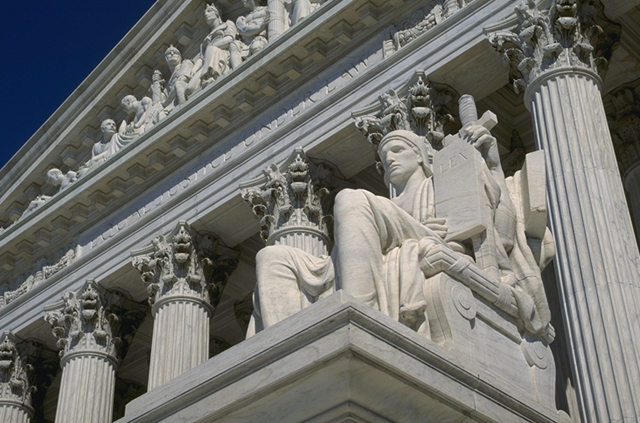Constitution
Which Executive Agency Has the Most to Lose by SCOTUS’ Decision to Overturn Chevron?

Nature abhors a vacuum. So do bureaucrats. When the vacuum is statutory silence or ambiguity, bureaucrats are quick to fill it in ways that give themselves more power. Nowhere is this more evident than “Chevron deference,” which has now been overruled.
What is – or rather was – Chevron deference?
Chevron deference, named after a Supreme Court case from 1984, has led to all sorts of administrative abuse across the spectrum of executive agencies. This is because the Court gave agencies the ability to identify “ambiguous” statutes that give that agency some sort of authority. Once identified, the agencies have made it a pattern to “interpret” the statute to mean whatever the agency wants it to mean.
This is exemplified in the Loper and Relentless cases that challenged Chevron deference. There, Congress had set forth a statute that permitted the National Oceanic and Atmospheric Administration (NOAA) to require fishermen to carry observers on fishing vessels to monitor their fishing practices. The NOAA felt that the statute was ambiguous as to who foot the bill for these observers and “interpreted” it to mean that the fishermen must pay. The Courts, feeling that Chevron deference tied their hands, agreed and allowed the NOAA’s interpretation of the statute to remain.
This has been common practice across the executive. But the question now exists: which agencies will suffer the most from the Supreme Court’s ruling? Which ones will be forced to return to the checks and balances originally intended by the Constitution? Which ones will be forced to abandon policies that only exist because of Chevron?
The candidates are numerous.
Now who loses?
For example, the Department of Agriculture attempted to classify a small puddle as a “wetland” under the Swampbuster Act. Such a designation is subject to review. But the Department of Agriculture, conveniently, interpreted “such time as the person affected by the certification requests review” to mean that review can only happen after a natural event occurs. Clearly, the language does not contain that qualifier, yet lower courts deferred to that interpretation.
Elsewhere, the Food and Drug Administration (FDA) took it upon itself to seize power under the Tobacco Control Act. Congress granted the FDA authority to ensure addicted, adult, cigarette smokers had access to lower risk tobacco products, such as e-cigarettes, to move away from cigarettes. Part of that process included evaluating the program’s effect on minors. The FDA took this and effectively banned flavored e-cigarettes, which was never a stated goal in the legislation.
Even the Department of Veterans Affairs misuses its authority under the guise of Chevron. In one example, a veteran who had qualified for disability benefits was denied three years of benefits. There, the veteran had gained employment with the National Guard, thus pausing his benefits. But when he left the National Guard, the benefits never resumed. When he made a claim, he was told that only one year of benefits could be credited to him, citing its own policy. But the statute never stated such an arbitrarily rigid one-year figure. But this interpretation was given deference by the courts.
Agencies on notice: no more!
Agencies still attempt to stretch these statutory interpretations all the time, even if they know the interpretation may be struck down in court later. For recent examples, the CDC tried to issue an eviction moratorium during covid, the Department of Health and Human Services tried to force nuns to purchase birth control coverage, and the EPA tried to regulate greenhouse gas emissions in industries not under its jurisdiction. Each of these actions were taken despite the statutory authorities giving no such power or wide discretion.
The Supreme Court did correct these bad interpretations, but not until years of litigation had occurred and some damage had already been done. Because courts side with government in more than 70 percent (more if Chevron is invoked) of interpretation disputes, agencies are incentivized to press the envelope.
The answer is that all agencies stand to lose. All of them utilize this de facto loophole in the law that allows agencies to make up authority to their own benefit. And all of them will be forced to justify their interpretations moving forward. In this case, when the agencies lose, the American people stand to win.
This article was originally published by RealClearPolicy and made available via RealClearWire.
Peter McGinnis is a communications and research professional who has worked for political campaigns and non-profit clients in his short but successful career. He worked for national campaigns and organizations before leaving for the world of public advocacy. Peter is passionate about transparency in government. He is a graduate of Temple University, earning a dual degree in political science and economics.
-

 Accountability3 days ago
Accountability3 days agoWaste of the Day: Principal Bought Lobster with School Funds
-

 Civilization17 hours ago
Civilization17 hours agoWhy Europe Shouldn’t Be Upset at Trump’s Venezuelan Actions
-

 Executive2 days ago
Executive2 days agoHow Relaxed COVID-Era Rules Fueled Minnesota’s Biggest Scam
-

 Constitution3 days ago
Constitution3 days agoTrump, Canada, and the Constitutional Problem Beneath the Bridge
-

 Christianity Today17 hours ago
Christianity Today17 hours agoSurprising Revival: Gen Z Men & Highly Educated Lead Return to Religion
-

 Civilization2 days ago
Civilization2 days agoThe End of Purple States and Competitive Districts
-

 Executive1 day ago
Executive1 day agoWaste of the Day: Can You Hear Me Now?
-

 Civilization4 days ago
Civilization4 days agoThe Conundrum of President Donald J. Trump










